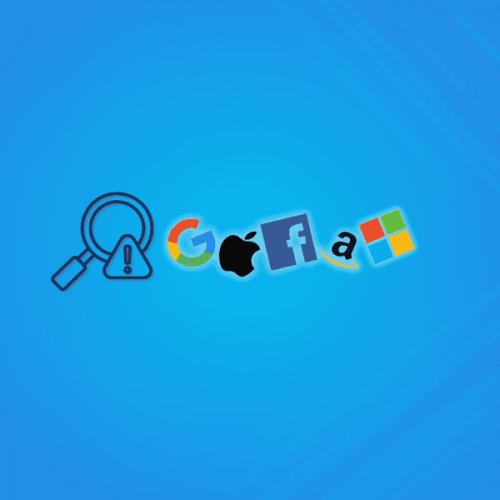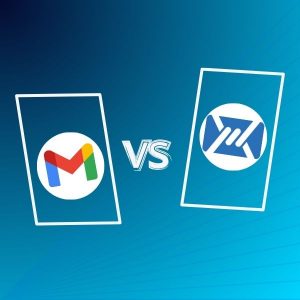You’ve definitely heard of the term Big Tech before. You may even have an idea of what it means.
What you may not know is the threat it represents to our personal freedoms and democracies.
In this article, we will dive deep into what Big Tech is, the problems these companies pose for our democracies, and what you can do about it. Let’s explore.
Big Tech: What Does it Mean?
Before diving deep into the dangers of Big Tech, let’s define what it means. Who or what are we referring to exactly?
The term “Big Tech” refers to the biggest technological companies in the world: Apple, Microsoft, META, Amazon, etc.
Depending on the context, the term might include other companies such as X or Netflix, and more recently, OpenAI. What these companies have in common is their enormous market share, consumer base, and general influence on society.
For most people around the world, at least one or several of these companies are an intrinsic part of their lives. They own an iPhone, watch Apple TV, search for things on Google, shop on Amazon, ask Alexa questions, etc.
But how did this state of affairs come to be?
A History of Big Tech Companies
While many think of Google as the first Big Tech company, we can actually trace back the history of Big Tech to much earlier.
In the ’60s and ’70s, IBM ruled the world with their mainframe computers, making them the first true Tech Giant.

At the time, their market share was estimated to be close to 70%. One of the keys of their success was their full suite of products, from hardware to software to maintenance. This created a vendor lock-in situation with many customers – a theme that will become recurrent in this article…
The advent of personal computers in the 80s saw the appearance of 2 new Big Tech companies: Apple and Microsoft. Among them, they control close to 95% of all computer and laptop OS’s across the world in 2024.
Then came the Internet revolution of the 2000s, from which emerged Google and Amazon. Next came the social media wave with the birth of Facebook, Instagram, Snapchat, and more.
As we can see, the emergence of Big Tech companies coincides with major technological innovations. However, it is not always the case that the first player to develop a new industry ends up capturing a major share of the market. Google was not the first search engine, neither was Microsoft the first operating system.
However, they offered a product that was better than the competition. And in doing so, they could benefit from something called “network externalities”.
In economics, “network externalities” refer to a product that gains value the more people use it. There is a reason most of your friends use Strava for their running stats, or go on X to share their opinions. If most people use a specific platform, it makes sense for you to be there too. This phenomenon is especially pronounced with social media platforms and tech products in general.
This means that when a company reaches a critical mass of users, it becomes very hard for a competitor to break into that market, and convince the users to move elsewhere.
Are Big Tech Companies Really That “Big”..?
When we talk about Big Tech, it’s often easy to forget how “Big” they truly are. Big Tech is only 5 or 6 companies at most, they can’t be that big… Right? Well, here’s a quick rundown of some of the products and services controlled by 3 of the biggest Big Tech companies:
Alphabet
Alphabet is the parent company of Google. Here are some of the companies they own:
- Google: 90% market share of search engines;
- YouTube: controls 50% market share of online video streaming (if you exclude Netflix and Amazon Prime, it even reaches 70%);
- Android: the mobile OS of Google is the default OS on non-Apple devices, making it ubiquitous.
- Gmail, Google Drive, Google Calendar, the Chrome browser, Waze… All of these services belong to Alphabet.
Amazon
You may think that Amazon is just a place where people go to shop. Well think again, because the reach of the parent company goes well beyond that:
- Amazon: the online marketplace has a 40% market share of online shopping in the US alone;
- Amazon Web Services (AWS): Amazon Web Services has become the leading cloud storage solution for businesses, with an approximate 35% market share. The rest is split between, you guessed it, 2 other Big Tech companies (Google Cloud and Microsoft Azure);
- Alexa: the personal assistant holds a 35% market share in the US;
- Amazon Prime: The video-on-demand platform has a 25% market share, and has even surpassed Netflix in the US;
- Need more? Twitch, Audible, iMDB, Ring, and more all belong to Amazon.
Meta
The parent company of Facebook has grown exponentially over the years through an aggressive strategy of acquisitions:
- Firstly, Facebook remains a dominant player in the social media landscape, with close to 70% market share in most regions;
- Instagram, WhatsApp, Messenger, and Threads all belong to Meta.
- Oculus, the VR headset company, controls between 75% and 90% of the market.
It’s almost impossible to find a tech industry that is not dominated by one of these Big Tech companies. Cloud storage? Check. Streaming? Check. E-readers, messaging, smartwatches? Check, check, and check. Maybe it’s time we start calling them “Massive Tech”?
The Problem with Big Tech Monopolies
These conglomerates have become an integral part of our lives, whether you are a simple user or a business.
By offering “free services”, they drive out and crush their competition whether they are start-ups, medium-sized businesses, or even large enterprises.

However, as the saying goes, “If the product is free, then you are the product”. These companies rely on your data for their business, a practice known as surveillance capitalism.
But what’s the big fuss with monopolies? Well, when a monopoly is firmly established, they get to charge whatever they want for their services. In a monopoly, a price could skyrocket, and you would still buy it because there is no alternative! Having a competitive market favors the end user: more options at more affordable prices.
In the case of Big Tech companies, the issue is more nuanced. You can’t really blame them for hiking up prices, because most of their products are free.
However, they stifle new competition and crush innovation by decreasing the entry of new companies into a market. Additionally, it has been reported that instead of acquiring companies, Big Tech firms are simply acquiring all their talent pool. Which is much harder to argue from an antitrust perspective.
Clearly, we are reaching the point where Big Tech needs to be stopped. Both EU and US leaders believe that Big Tech has grown out of control and that we need to take immediate action.
Trapped by vendor lock-in
However, when a Big Tech company has its hand in so many products, it can be hard to change. This is due to a phenomenon called vendor lock-in. This term describes the techniques used by service providers to make it incredibly difficult for you to switch to another service. If you were to degoogle your life, you would need to:
- find an alternative to YouTube, which would mean losing all the channels you follow, your viewing history and playlists, etc.
- replace Google Drive, where you have likely stored hundreds of important documents, photos, etc.
- stop using Google Maps, where you already have all your favorite restaurants and hotels saved.
You can imagine the huge burden this represents for everyday people. But this is exactly how Big Tech wants to trap you with vendor lock-in. Even if you want to switch, the trouble it represents becomes too much to contemplate.
The Echo Chamber Effect
So far, we’ve described the omnipresence of Big Tech companies and the problems posed by monopolies.
However, there is a much darker danger posed by such huge companies controlling vast sectors of the Internet.
When you buy a book on Amazon, you will get recommended similar books. If you watch a video on YouTube, your feed will fill up with similar videos. If you like a tweet on X, you will get shown similar tweets.
Over time, this creates echo chambers: places where similar ideas and beliefs are constantly reinforced.

Sure, this is not an issue if you enjoy nature videos, and get recommended more nature videos. Or cat videos. But what happens if you watch a video explaining how we actually didn’t land on the Moon? Or how the Earth is flat? Or 9/11 was a hoax? Suddenly, you get recommended hundreds of videos and channels that reinforce this point of view. And if you are easily persuaded, this becomes your worldview.
These echo chambers create division among people. If we can’t agree on basic facts, how can we communicate together? While divisions and differences of opinion have always existed, Big Tech and social media exacerbate them, driving resentment and anger for “the other side”. This, in turn, favors populist politicians, who rarely have democracy as their priority.
Big Brother is Watching You
Most of us know the famous “1984” novel by George Orwell. People often refer to something being “Orwellian”, a synonym for “dystopian”. The novel “1984” depicts a totalitarian society ruled by the Party, led by the mysterious figure Big Brother.
Big Brother is the symbolic, omnipresent leader representing the absolute power and control of the state. Everywhere they go, citizens are reminded that “Big Brother” is watching them. Even into their homes.
Some may argue that our governments are moving in that direction. However, what is certain is that Big Tech is the 2024 version of Big Brother. Think about it… You are constantly watched and listened to. You provide all your data for free. And you are then manipulated based on that data, for commercial or political gains.
The amount of data we share with Big Tech companies, knowingly or unknowingly, is staggering. It is often said that they know more about us than we do. However, online privacy is key to securing our Western democracies, which we’ve discussed in detail in this article.
The issue with sharing so much data is not just commercial, it’s also political.
Think back to the Cambridge Analytica scandal. In 2018, it was revealed that this political consulting firm had improperly accessed data from millions of Facebook users without their consent. They then used this data to create psychological profiles and target voters with personalized political ads during the 2016 U.S. presidential election and the Brexit referendum.
Big Tech companies can not only influence what you buy. They can push you to vote for one candidate or another. And that is a real threat to our democracies.
What Can You Do About It?
Believe it or not, but as a consumer, you have a lot of power. If you stop supporting monopolistic companies and favor smaller companies like a local bookstore, you help maintain a healthy competitive market. If enough consumers don’t buy products from Big Tech, then these companies will be forced to change both their business model and approach.
Ideally, you should switch to privacy-focused services as much as possible. These companies seek to protect your data instead of monetizing it. There are multiple ways to protect your online privacy and protect your data.
Here at Mailfence, we provide a private and secure email service. Check out how Mailfence meets your email privacy and security expectations. You can also learn to protect your privacy, starting with this great email privacy and security course.
The ultimate tip, however, to solve the concerns with Big Tech is to educate yourself and become aware. Mass data collection is happening and will be the norm unless you realize your personal data belongs to you, and that you can actually act on it.
If you want to try to use privacy tools like end-to-end encryption, digital signatures, and two-factor authentication (2FA), you can subscribe to the free plan of our Mailfence suite right now!
It includes :
- a calendar with polls, contacts, and groups management,
- a chat service,
- a document storage and management platform,
- and 500 MB of data storage.
All are secured and private, meaning you’ll enjoy complete privacy for all emails, documents, and records you’ll keep there. All you have to do is try it now!




